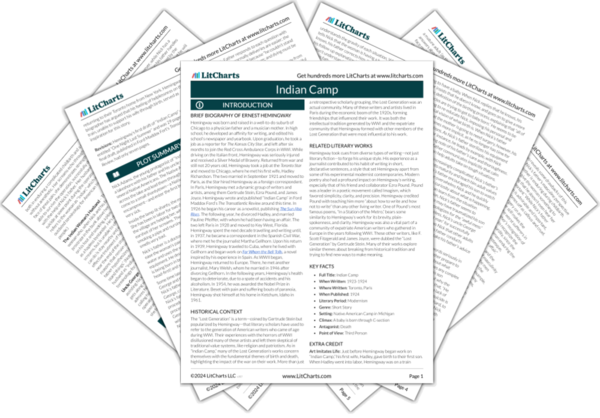In “Indian Camp,” the Adams family (who are certainly white, though this is never specified) come to an Indian village to assist a difficult childbirth. The complex dynamic between these characters of different cultural backgrounds shows that such encounters often have mixed results. When people share their unique knowledge with people from a different culture, the results can be positive, as when Nick’s father’s medical expertise saves the lives of the Native woman and her baby. On the other hand, when outsiders enter a different cultural space without grace or care, they can humiliate and hurt other people as well as themselves. Nick’s father and uncle, for example, are cruel and dismissive to their hosts because they seem to believe that Native people are less deserving of respect. The story, then, is something of a parable for European settlers’ treatment of native peoples in American history, in which white settlers believed they were bringing civilization to a “New World,” but their callousness only brought destruction and suffering for the people who lived there first.
To highlight the cultural differences between white American and Native American culture, Hemingway contrasts Nick’s father’s medical practices with the traditional birthing practices already underway when he arrives at the shanty. These descriptions paint Western culture as ordered, clean, and effective, while Native culture is portrayed as uncivilized, chaotic, and dirty. For example, Hemingway’s narrator takes note of the inadequate sanitary conditions of the shanty when the Adamses arrive, which Nick’s father’s training in Western medicine leads him to immediately remedy. The first thing he does is fastidiously clean his hands and his tools, and he doesn’t begin operating until he has ensured a higher standard of cleanliness. Nick’s father also imposes order via a structured hierarchy; he enlists Native Americans as his surgical team, and, with them reporting to him, they are able to perform a successful operation. This depiction suggests that Nick’s father has been able to create life-saving order out of hopeless disorganization, clearly indicating a view not only that the birth would have been doomed if not for the arrival of this white doctor, but that the cultural and medical practices in this Native American village are inferior to those of white American culture.
While Nick’s father does appear to save the woman’s life by bringing his expertise to her childbirth, his treatment of his Native patient provokes the reader to consider how his prejudice affects his ability to do his job. Certainly, she would have had a better experience if her doctor had treated her like a human being. For example, it’s clear that the mother’s screams are extreme enough that they cause deep distress to her husband and to other villagers in the shantytown (who try to stay out of earshot). Nevertheless, the screams don’t faze Nick’s father. As he prepares to operate on her without anesthetic, he even says that he doesn’t “hear [her screams] because they are not important.” Furthermore, when Uncle George holds the mother down for Nick’s father to operate on her, she bites him, likely due to the pain of undergoing a surgery without anesthetic. Rather than bearing this (relatively minor) pain and empathizing with her distress, Uncle George’s first reaction is to call her a “squaw bitch.” This reaction discloses a lack of empathy for her situation and is inflected by racial prejudice.
Ultimately, the mixed outcome of Nick’s father’s intervention (the child is successfully born, but the mother is left sickly and pale and her husband kills himself) illustrates the mixed results of imposing one’s culture on another. The story leaves open the possibility that, despite the surgery’s “success,” Nick’s father and uncle’s disrespect and cruelty have demoralized and traumatized the mother, while driving the baby’s father to suicide. Readers thus must ask themselves what “progress” means and whether it is even desirable if it causes such distress, but this is a question Hemingway doesn’t attempt to answer.
Cross-Cultural Encounters ThemeTracker

Cross-Cultural Encounters Quotes in Indian Camp
Inside on a wooden bunk lay a young Indian woman. She had been trying to have her baby for two days. All the old women in the camp had been helping her. The men had moved off up the road to sit in the dark and smoke out of range of the noise she made. She screamed just as Nick and the two Indians followed his father and Uncle George into the shanty.

Unlock explanations and citation info for this and every other Indian Camp quote.
Plus so much more...
Get LitCharts A+“Oh, Daddy, can’t you give her something to make her stop screaming?” asked Nick.
“No. I haven’t any anesthetic,” his father said. “But her screams are not important. I don’t hear them because they are not important.”
“Those must boil,” he said, and began to scrub his hands in the basin of hot water with a cake of soap he had brought from the camp. Nick watched his father’s hand scrubbing each other with the soap. While his father washed his hands very carefully and thoroughly, he talked.
Later when he started to operate Uncle George and three Indian men held the woman still. She bit Uncle George on the arm and Uncle George said, “Damn squaw bitch!” and the young Indian who had rowed Uncle George over laughed at him.











